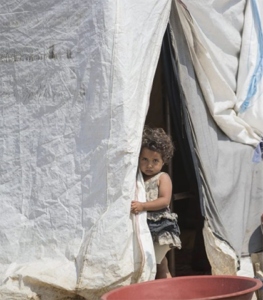Rate of refugee displacement rising – UN report
Conflict, poverty, violence and human rights violations are driving record numbers of people to flee their homelands, according to new data from the United Nations Global Trends 2018 report.
 Last year, an estimated 13.6 million people were newly displaced due to conflict or persecution, raising the total number of people who have been forced to flee their homes to a record 70.8 million.
Last year, an estimated 13.6 million people were newly displaced due to conflict or persecution, raising the total number of people who have been forced to flee their homes to a record 70.8 million.
And the UN says the rate of displacement is rising with 37,000 people being forced from their homes each day – or 25 every minute.
“The number of refugees is the highest number since we started tracking them,” said Sibylla Brodzinsky, a spokeswoman for the UN High Commissioner for Refugees (UNHCR).
Of the displaced, 28 million – or 40 per cent – fled to another country and are considered refugees, the UN data shows. Four in five now live in neighbouring countries.
Another 40 million fled from their homes but remained in their native country and are counted as ‘internally displaced’.
According to the 1951 Convention on Refugees, a refugee is someone “who is unable or unwilling to return to their country of origin owing to a well-founded fear of being persecuted for reasons of race, religion, nationality, membership of a particular social group, or political opinion.”
Two thirds of refugees in 2018 came from just five countries, the UNHCR report says: Syria (6.7 million), Afghanistan (2.7 million), South Sudan (2.3 million), Myanmar (1.1 million), Somalia (0.9 million). Venezuela is likely to move into the top five in 2019.
Although 85 per cent of refugees come from poor and middle-income countries, it is conflict rather than poverty that drives migration, the report said.
Children below 18 years of age constituted about half of the refugee population in 2018, up from 41 per cent in 2009 but similar to the previous few years, the report said.
Despite blanket media coverage of refugees in Europe and the United States, most displaced persons seek refuge in countries that neighbour their homelands.
In 2018, the countries that hosted the most refugees were: Turkey (3.7 million), Pakistan (1.4 million), Uganda (1.2 million), Sudan (1.1 million) and Germany (1.1 million).
During 2018, 2.9 million displaced people returned to their areas or countries of origin, including 2.3 million IDPs and nearly 600,000 refugees. But returns have not kept pace with the rate of new displacements.
In 2018, UNHCR submitted 81,300 refugees to States for resettlement. According to government statistics, 25 countries admitted 92,400 refugees for resettlement during the year, with or without UNHCR’s assistance.
Asylum-seekers submitted 1.7 million new claims. With 254,300 such claims, the United States of America was the world’s largest recipient of new individual applications, followed by Peru (192,500) Germany (161,900), France (114,500) and Turkey (83,800).
By the end of 2018, about 3.5 million people were awaiting a decision on their application for asylum.
With no end to conflict in sight and the world’s population expected to increase in a few decades from eight billion today to 10 billion, ever larger numbers of people will likely be on the move seeking safety and a better life, the UN report says.
That will likely put pressure on the UNHCR. The agency supplies food, water, medicine, schools and other basics to refugees. It also provides legal protection to prevent the exploitation of stateless people.
Rising numbers of migrants will also put pressure on the nearly 150 countries that have signed the 1951 Refugee Convention. That agreement bars signatories from sending refugees back to countries considered unsafe.
Throughout much of Europe, the arrival of a million mainly young men from a different culture sparked an anti-immigrant backlash. Hungary and other Balkan nations threw up fences to bar refugees from entering their countries.
Ultimately, Europe, Turkey and Libya all agreed to introduce measures to stem the flow of refugees to wealthy nations. Their efforts were largely successful.
Turkey was paid billions of dollars to halt boats carrying refugees across a narrow strait to Greece. Other, sub-Saharan, refugees travelled to Libya and embarked on dangerous, flimsy boats towards Italy. Several European countries blocked them and tried to prevent humanitarian ships from encouraging refugee flows by coming to refugees’ aid at sea.
Migrant arrivals to Italy dropped by 98 percent in the first half of this year – to about 3,500 – from the 181,000 landed last year, the UN report says.
This drop followed the government barring boats carrying refugees from landing at any Italian port.
The United States has seen a surge in anti-immigrant sentiment, fanned in part by President Donald Trump, the report says.
It cites President Trump calling Mexicans and other migrants rapists and criminals who threaten Americans’ security.
In fact, the UN report says, evidence shows migrants and refugees are less likely to commit crimes than native-born Americans.












